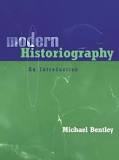Michael Bentley - Modern Historiography (1999)
‘Most of this brief account first appeared in 1997 as part of a large-scale study of historiography, edited by the present writer and published by Routledge under the title Companion to Historiography. There were and are strong arguments for leaving it there. (…) Following some discussion and helpful reports from readers, we decided to go ahead (….), largely on the strength of two considerations. First, the larger volume had been intended for reference collections in libraries and its cost placed this brief account beyond the pocket of most students and faculty. There seemed much sense in finding a format that would allow an inexpensive paperback issue of the most “immediate” section of it so that students could use it in studying their history courses or as part of a general approach to the subject. But a second thought also appeared germane. Something approaching a revolution in the status and content of historiography is currently underway; and it struck both author and publisher that some good might be done by making this review of recent discussion more widely available at once. (….)
“Are you a postmodernist?” The tedious question emerges pretty quickly among gatherings of historians nervous of historiography and terrified by “theory”. It is meant to carry the same force that “Are you a Protestant?” might have exerted during the Counter-Reformation. It is a bad question in that it has no serious or unambiguous answer. Those who reply in the negative are often historians whose work suggests that they are in fact irremediably steeped in the poison they pride themselves on having refused to swallow. Equally, those who adopt the label with triumphal complacency are often underpowered individuals who would welcome any argot that made them appear discerning intellectuals. Better, perhaps, to move beyond an assumed contrast of position and recognize, quite simply, that the form and content of discussion throughout the humanities since the 1970s have shifted in ways that have produced distinctive approaches to many of the concepts that historians assume every day - knowledge, understanding, imagination, explanation, analysis, narrative - and that, whether the result has been desirable or not, no one but a hermit in a cave is likely to have remained unaffected by some of them if only in self-conscious reaction. (…)
This little book is about those images as they are implied in historical accounts written at various moments and in a number of intellectual locations over the past two hundred years. Not unreasonably in an introduction, it does no more than introduce. If one student picks it up and comes away thinking that history is a good subject because it makes the mind turn by challenging it to explain why the past looks the way it does, and why it once looked some other way, then the project will attain its objective. If one professional historian glances at it and finds three sentences that stimulate a cultural comparison or a tremor in perspective, then it will more than serve its modest purpose. (…)
We have seen the sense of finality that accompanied the collapse of Communist Europe after 1989 and its accompanying End of History confidence. It has not lasted. Looking around the globe in 1998, the apparent crumbling of South-East Asia’s capitalist miracle, its consequences for the economies of Japan and Australia and repercussions, in a globalized financial structure, as far away as New York and London give little credence to the brave new world of liberal capitalism announced by Fukuyama in 1992.* Continuing eruptions of nationalist Angst in the Balkan peninsula, with impending tragedy in the region of Kosovo, reflect in an extreme form a more general malaise about ethnicity and identity, prompting the thought that the peoples of the West have entered as much a period of doubt and questioning as one characterized by serenity. The political mood of the anglophone world, emphasized by the re-election of Clinton and the coming to power of Blair in Britain, increasingly appears a rhetorical construction: the smiles betray false teeth that so far have shown little ability to bite on the structural problems of both societies. Intellectually, too, one can detect a backlash against the cuddly correctnesses of postmodernism and an impatience with a vocabulary that often has not led anywhere. Does any critical historian exist who has not wanted to scream at the thousandth mention of “discourse” when listening to conference papers? The rejection has now reached print, too - particularly among writers wishing to defend an older empiricism and rail against a sense of intellectual inertia.* On the philosophical level a parallel outlook has begun to emerge. Defences of “realism” in theories of historical knowledge have sharply rejected the postmodern assumption that knowledge is ultimately unobtainable and tried to conserve the possibility of an historical enquiry that does more than talk about the “coherence” of an interpretation but insists rather on moving beyond such paleness to make a claim instead about “truth”. It is too early to say whether this turn of mind heralds a revival of positivism of a 1960s kind, but instinct says that it will not.
In so far as postmodern concerns and questions have informed the creation of a new historiography, they have done so most powerfully, perhaps, within two clusters - one relating to subject matter, the other to method. (…)
History has often followed where Thought - philosophy, psychology, sociology, anthropology - has led, though the historical community’s cherished and admirable resistance to Thought has normally interpolated a time lag of several decades before the impact has become noticeable. That is why prediction becomes so pointless. It may become relevant all the same that the philosophers have already begun their back-lash against postmodern pessimism over the possibility of gaining historical truth and in thirty years’ time we may see the historians back on its trail. One straw in the wind strikes the present writer and, since this has been a shamelessly personal account, there seems no harm in mentioning it. In the summer of 1998 the World Congress of Philosophy is hosting in Boston, among its other attractions, a panel on the philosophy of history. Of the three speakers, two will be philosophers and one an historian. The subject will be narrative and its relation to historical truth. Now just a couple of decades ago historians would have wagered good money on the philosophers’ arguing against the possibility of historical truth and the historian’s bleating that there was something in it. This occasion will see the reverse. Two professional philosophers will press the case for a “realist” approach to historical knowledge and blow away the pretensions of postmodern confusion and cultural relativism. The historian, drawing less on epistemological theory than on a sense of what actually happens when history gets made by its practitioners, will find himself arguing the counter-case. Quaint, this. We seem to have reached an odd point in our evolution where it is the historian who has to preach the fragility of his own subject’s truth claims to those who have never tried to construct them but none the less regard them as robust. Either the philosophers have not read enough historiography or the historian has read too much. At any rate the latter will almost certainly fail to convince a philosophical audience that relativism will not go away, that thoughtful historians suspect that their methods are inadequate to overcome doubts about attaining “truth”, and that historiography contains within its complexities and contestation the measure of our difficulty if not the solving of it.
I shall do my best.’
All quotations are taken from the preface and postscript of: Michael Bentley, Modern Historiography. An Introduction (1999).
Notes (*). Michael Bentley referred in a first note to: Francis Fukuyama, The End of History and the Last Man (1992). His remark for a second note was: ‘See in particular John Vincent, An Intelligent Person’s Guide to History (1995) and Richard J. Evans, In Defence of History (1997).’
Postscript by Irène Diependaal, written for Hereditas Historiae
At the time of writing Modern historiography and its preceding Companion to Histotiography, Michael Bentley was professor of modern history at the University of St. Andrews, the first university founded in Scotland (1413). Nowadays Bentley, born in 1948, is emeritus professor. On the website of St. Andrews a short recapitulation of Bentley’s research activities is made: ‘The political and intellectual history of Britain in the nineteenth and twentieth centuries. Philosophy of history and historiography.’ All his research publications are enlisted on this website. They include some major publications like The liberal mind, 1914-1929 (1977), Politics without democracy, 1815-1914. Perception and preocccupation in British government (1984, revised edition 1999), The climax of liberal politics. British liberalism in theory and practice, 1868-1918 (1987), Lord Salisbury’s world. Conservative environments in late-Victorian Britain (2001), Modernizing England’s past. English historiography in the age of modernism, 1870-1970 (2005) and The life and thought of Herbert Butterfield. History, science and god (2011).

